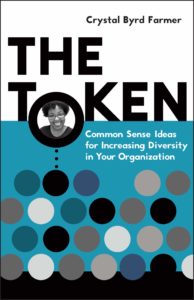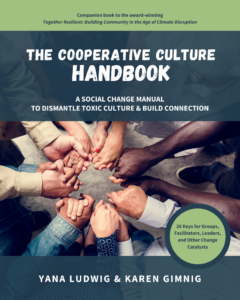by Kathleen Biernat

The Foundation for Intentional Communities (FIC) offered a 5-week course in June, called Building Diversity and Inclusivity in Communities, taught by Crystal Farmer. Crystal is an FIC board member, diversity consultant, and author of The Token: Common Sense Ideas for Increasing Diversity in Your Organization, who supports communities and non-profit organizations with diversity, equity, and inclusion. Kathleen Biernat and Hope Horton attended (and highly recommend) this experience, which will be repeated starting on August 27.
I want to convey my heartfelt thanks to the members of the Common Ground Ecovillage Membership and Marketing Circle. Your sponsorship to attend this course has affected me deeply. I entered the class with eagerness to learn, grateful for the opportunity. I presumed I’d gather information and practices that might help CGEV (and myself) grow. I didn’t realize that it would uncover mental habits that have created barriers for people I love dearly and we (CGEV) wish to include. The five week course is done, the work has just begun.
Rather than try to describe all that we covered I am writing about my experience of learning in these ways:
- to live with more understanding and congruence toward a range of genders, races, identities, abilities, disabilities, ages, ethnicities, sexualities, nationalities and appearances;
- how to be more conscious of my biases that distort my ability to see Truth.
Our straight talking leader, Crystal Farmer, began by preparing us for the upsetting nature of the work ahead. We agreed to guidelines for a safe forum. When one of us felt hurt, angry or anxious, it was our responsibility to non-aggressively communicate. And, she assured us we would be triggered!
Crystal advised us to:
- pay attention to our internal reactions and rising emotions
- gather resources for processing emotions outside of the group
- recognize that apologies are a beginning of reparation…
- …and that backpedaling, blaming or defending are not.
What I Didn’t Know
W e reviewed Six Components of Conflict Resolution from the by Yana Ludwig and Karen Gimnig to help us to handle any disagreements or confusion. Crystal was patient and accepting while making sure we understood that unintentional harm still causes suffering. We were not patronized or coddled. We were informed that it is not fair to ask the person(s) harmed to reassure or comfort the person(s) causing harm. She defined microaggressions, cultural appropriation, subversive judgement of age, youth, disability, mental health, body size, skin color, cultural origins, sex & gender preferences, and I realized that these all exist in me.
e reviewed Six Components of Conflict Resolution from the by Yana Ludwig and Karen Gimnig to help us to handle any disagreements or confusion. Crystal was patient and accepting while making sure we understood that unintentional harm still causes suffering. We were not patronized or coddled. We were informed that it is not fair to ask the person(s) harmed to reassure or comfort the person(s) causing harm. She defined microaggressions, cultural appropriation, subversive judgement of age, youth, disability, mental health, body size, skin color, cultural origins, sex & gender preferences, and I realized that these all exist in me.
I felt little organisms, like crusty oysters, popping open inside me. Gooey, messy emotions exposed. What must it be like for Crystal to present this information and watch the “oh” reactions,”not me” denials, and “ouch!’s”? Do they still hurt her? Does she feel disappointed or tired?
We went over the fact that uncovering discrimination and superiority in ourselves or fellow community members would cause stages of denial, resistance, sadness, regret and pain. But this is what growth asks of us. If I want to live the idea that we are all equal I’m going to have to look at the racist, fearful, judgemental programming inside of me.
As the land is now, we are unable to welcome people with most physical disabilities. My natural instinct is to help – open the door, remove the obstacle, assist with reaching (microaggression ?). Folks with physical or neural variations have worked diligently to be as functional as they can.Lesson: Asking before acting to “assist” is the best way to value someone’s autonomy. Adults can consent; ask children, too.
Neural and developmental disability can be mostly invisible: PTSD, autism, ADHD, depression, addictions, congenital and intellectual variations. Neurodiversity and neuroplasticity are topics I have studied and tried to implement in my own life. Someone who appears to be neurotypical may conceal a need that requires consideration, such as help staying focused during meetings or requiring more time to respond and integrate information. Offering reminders and outside support are ways we can adapt to compassionately include individuals with these challenges.
Crystal walked us through many other issues, such as gender identity and sexual orientations, treatment of the less mentally or physically able, examples of microaggressions, the difference between cultural appreciation vs. appropriation, the subtlety of latent discrimination, perfectionism and what people coming to Common Ground may have endured before approaching us. My heart was hurting. It’s going to take some brave souls to want to come from a ‘diverse’ culture or lifestyle and stand for their place among a mostly white community.
What I thought I Knew
I am privileged. I thought I knew that. The child of a world traveled, educated white man, I grew up witnessing my first generation Asian, Venezuelan, Dominican, Indian, Pakistani and Moroccan friends deal with language and educational disadvantages. I was taught that everyone is equal. We should give everyone the benefit of doubt; don’t take things personally.
My mom escaped from North Korea to South Korea, along with a fragment of her family. She endured things I cannot fathom; abandonment, walking through war, stepping over bodies, having the person next to her shot or lose body parts from explosion. Starvation, rape, exploitation and the suicide of her father fed her determination to find a decent way of life. She met a kind blue-eyed man while working as a waitress at the Army officer’s club. They married and conceived their first child. They began a life together in the U.S.
I watched my mother learn to drive, master a new language, upgrade her third grade education, earn a GED, run a household and raise 3 kids. She did this while Dad worked a 40+ hour week and went to college at night. We ate well, dressed well, had a nice car and home. My brothers and I were teased and called names because of the foods we ate and how we looked. My older brother learned to fight and built his body size so that he was able to defend himself. My younger brother used humor to defuse the taunting. I tried to be perfect, be invisible by being pleasing, excel in school, be everyone’s friend. For goodness sake! How could I be racist?
This course revealed how I used code switching and masking for my benefit. I did not realize it feeds white supremacy and adds barriers to the well being of many. Ack!!
How Will I Use it
The biggest takeaway for me is the importance of balancing identity, consent and the need to belong – being aware of my own filters.
- First, identify the socialization that sets us up for prejudging. This class has helped me begin this process. Thank you!
- Second, be willing to accept the prejudices (ouch!) hiding in me without blame.
- Lastly, know I’m not alone and that I can change.
Crystal gave us optional homework assignments that conveyed this info aurally in podcasts, visually in videos and charts, and experientially. I’m including a few below. Please ask for more if you are curious.
Thanks again, Kathleen
The Triangle of Consent- http://blackandpoly.org/the-triangle-of-consent/
Seeing White: How Race Was Made https://www.sceneonradio.org/episode-32-how-race-was-made-seeing-white-part-2/
Genderbread Exercise- https://www.genderbread.org/resource/genderbread-person-v4-0
Disability Visability Project- https://disabilityvisibilityproject.com/2017/12/10/ep-13-autonomy-and-disabled-people/
Intent & Impact- https://everydayfeminism.com/2013/07/intentions-dont-really-matter/
Crystal Byrd Farmer’s book The Token, Common Sense Ideas for Increasing Diversity in Your Organization










